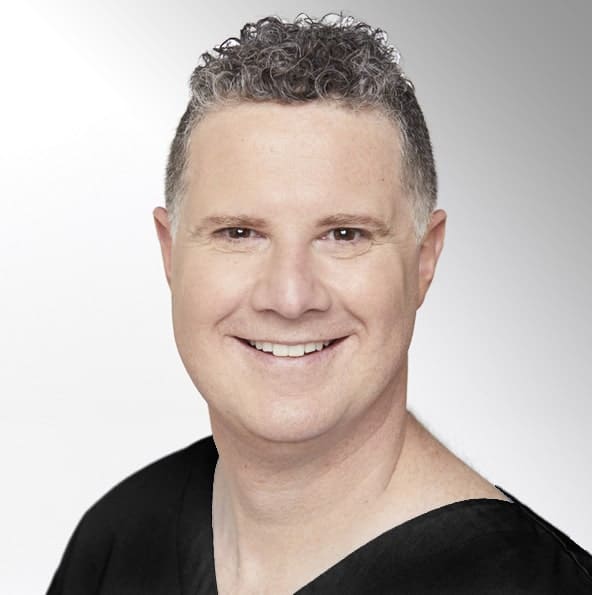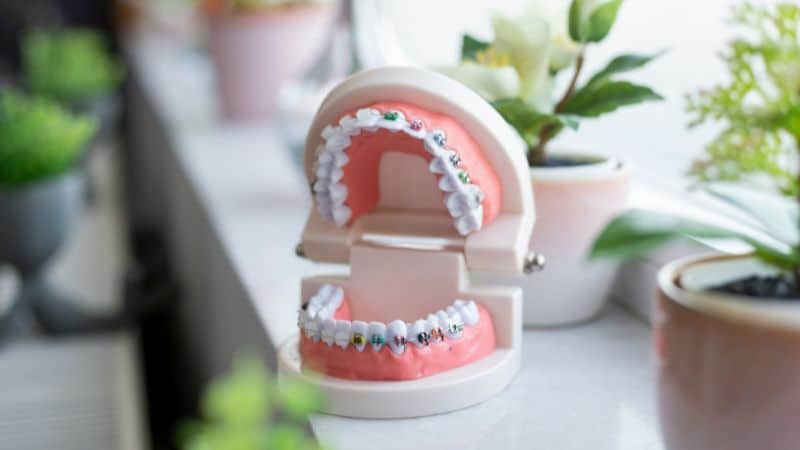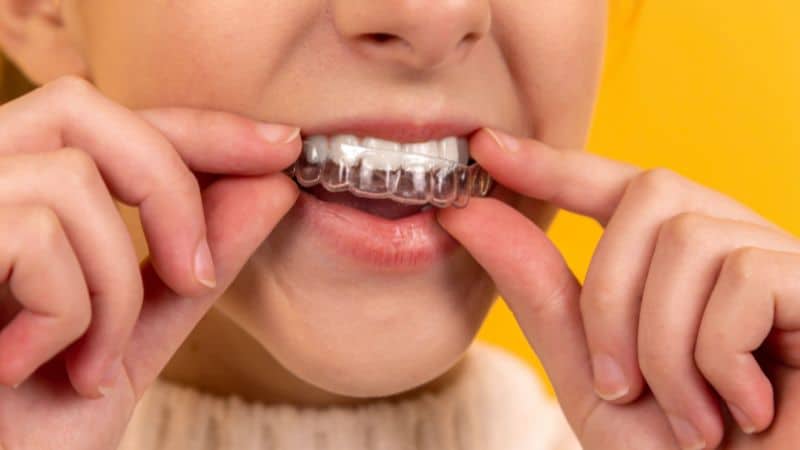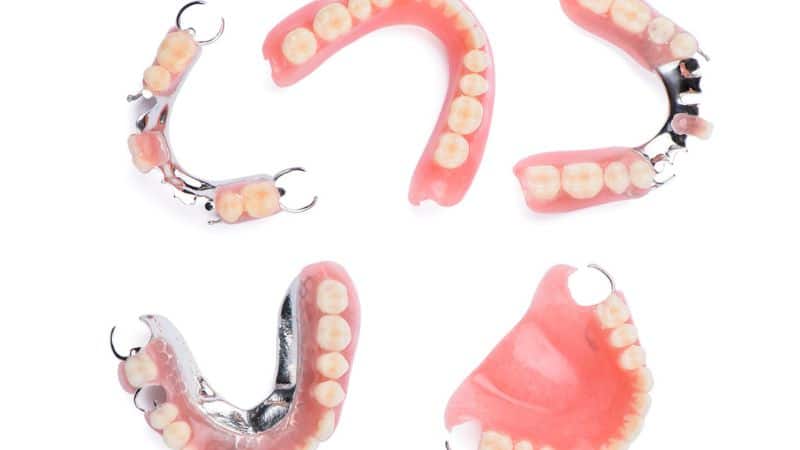
Types of Dentures: Complete and Partial
When it comes to replacing missing teeth, there are many choices. Bridges, implants and dentures are all available options. Your dentist and/or a denturist will be able to evaluate your oral condition (number of missing teeth, gum and bone conditions) in order to propose the best possible solution for your needs and budget. In this article, we will discuss the different types of dentures, partial or complete, implant or non-implant, which denturists specialize in.
What Are Complete Dentures?
The term complete dentures, also called full dentures, refers to dentures that take up the whole mouth rather than just one area. They are used when all the natural teeth are missing, which is why they are often called false teeth. Complete dentures consist of a base made of acrylic resin that replicates gum tissue. This base supports a full set of acrylic resin or porcelain teeth.
There are many types of complete dentures.
Conventional Dentures
Conventional full dentures are the ones you are probably most familiar with. These types of dentures are removable and are held in place by suction. They take some time to get used to and may cause discomfort at first. Conventional dentures are relatively inexpensive, simple to fabricate and repair, and provide a level of aesthetics and function that many patients find acceptable.
Implant Retained Complete Dentures
Implant retained dentures are similar to conventional dentures as they are also removable. However, this type of denture is maintained in place by implants. Because they “snap” into place, they are often referred to as snap-on or snap-in dentures. Implant-assisted dentures are ideal for patients requiring the replacement of all teeth in the upper and/or lower arch of the mouth.
These types of dentures are much more stable and less likely to fall out than conventional dentures. Because they are installed on implants, these “retained” dentures allow for optimal eating and speaking and helps preserve the underlying bone. Research has proven that implant retained dentures provide a bite force that can be as much as 300% higher than conventional dentures.
There are two types of implant retained dentures:
Locator-Attached Denture: These types of dentures can use as few as two dental implants that act as anchor points for the denture. The implant consists of a spherical abutment, which is inserted into a metal attachment housing located on the denture.
Bar Attachment Denture: These types of dentures, often called overdentures, also require dental implants. A custom-fitted support bar is affixed to dental implants. The teeth snap into place using special retention clips.
When there is not enough natural bone to support traditional dentures, mini-dental implants can be used to give you back your smile.
Implant-Supported Complete Dentures
Also known as all-on-4 dentures, these dentures are ideal for patients who are looking for a more permanent tooth replacement solution. In this technique, the prosthesis is screwed to four or more implants installed in the mouth and can only be removed by a denturist. These types of dentures are the best type of dentures a person with a large amount of healthy bone can have.
With implant-supported dentures, you can regain 90% of your chewing ability and enjoy the taste of food again as the upper denture doesn’t need to cover the palate. The way they are designed gives these dentures a very similar appearance and function to that of natural teeth.
Comparison Table of Complete Dentures
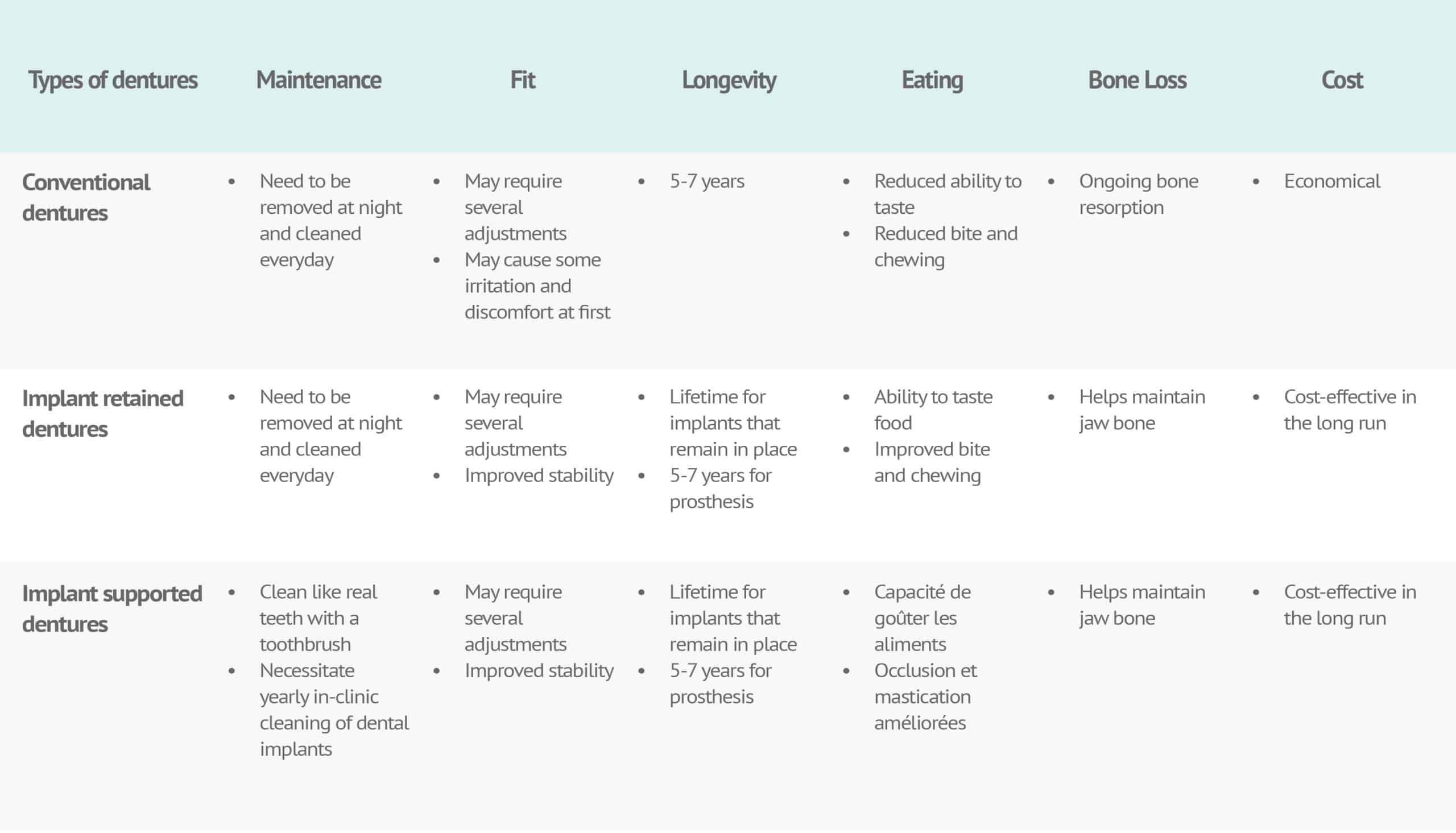
Complete implant-retained and implant-supported dentures are more comfortable as they do not apply pressure on the gums. Dentures on implants are also a good option for patients looking to keep their ability to taste as palateless options are more stable with implants.
What types of dentures are the best?
With many types of dentures and materials available, it is beneficial to think long-term. Working with a denturist enables you to identify the best solution for your specific needs and budget. For example, implant-supported and snap-on dentures are the best solutions in terms of stability but are also more expensive than conventional dentures.
What Are Partial Dentures?
Removable partial dentures are an excellent solution for replacing missing teeth in patients whose condition does not allow for a bridge or dental implant. A partial denture is a device containing replacement teeth that attaches to the remaining teeth with a plastic or metal clip.
Partial dentures are affordable and like full dentures, require daily maintenance. They provide improved aesthetics and overall function for eating and speech.
There are three types of removable partial dentures.
Cast Metal Removable Partial Dentures
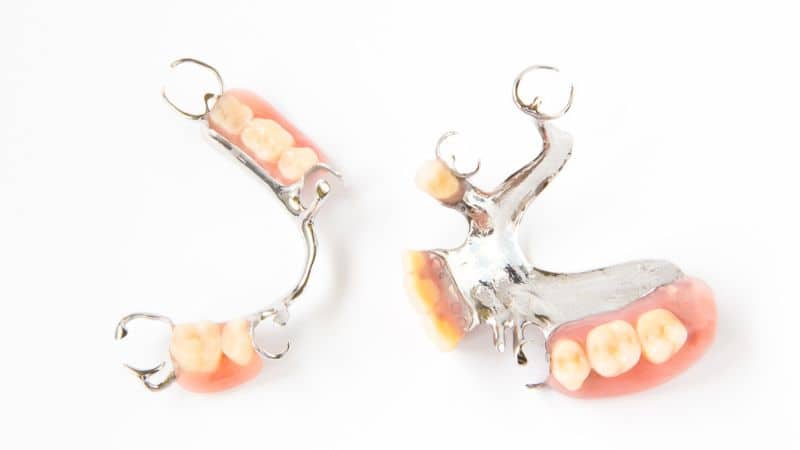
This type of prosthesis is probably the most common. It consists of artificial teeth set in a gum-colored acrylic resin mounted on a cast metal frame with either precision or metal attachments. Precision attachments are less visible than metal ones but more expensive.
Cast partial dentures are stronger, more durable, and retentive compared to conventional acrylic partial dentures.
Acrylic Removable Partial Dentures
Acrylic partial dentures, also called flippers, are less expensive than cast metal ones but are less durable. The replacement teeth are fixed into a pink acrylic base to minimize the risks of breakage. These types of partials are less effective and generally considered a temporary solution.
Conclusion
When selecting complete or partial dentures, the best solution for you will meet your dental requirements, your budget and your desired level of comfort.
For a complete mouth restoration, full dentures on implants are the best options offered today. With these types of dentures, you will no longer have to worry about your dentures getting loose and your ability to bite and taste food will be greatly improved.
For partial dentures, cast metal partial dentures are still the best affordable and resistant solution available for patients who are missing a few teeth.
After an assessment of your dental condition, your dentist, in collaboration with a denturist, will be able to guide you towards the right choice of dentures for you.

